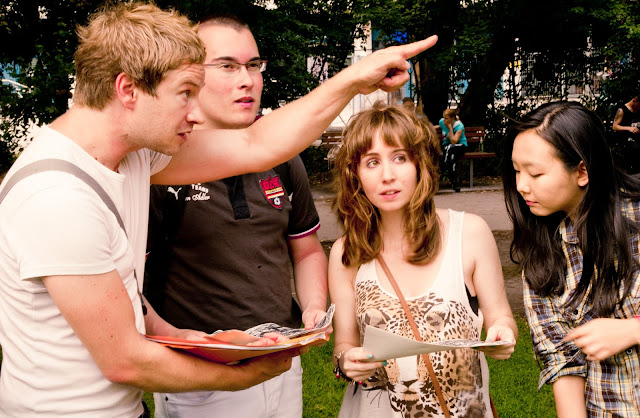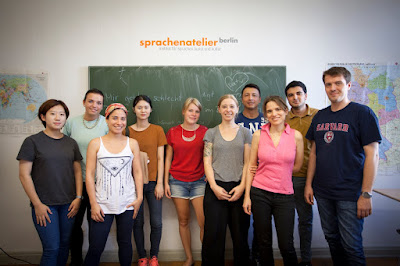German Stereotypes
 |
„The Germans are efficient „
In popular culture, we never seem to stop hearing about ‘German efficiency.’ Everything they do is efficient- from eating breakfast, to going shopping, to small talk with neighbours and work colleagues.
While there is some truth in this statement and the success of the German economy is testament to the country's productivity - it is not a general golden rule that ALL Germans are efficient ALL the time.
One of the most anticipated projects in Berlin's recent history is the new international airport which is currently almost 5 years late and there is no final end date as yet in sight! The airport was initially supposed to be launched in June 2012 but because of fire safety issues, it has since been postponed a total of three times. These delays have doubled the cost to 5 billion Euros!
Here, you can track the daily cost of the airport!
Despite this, German efficiency and productivity remains high and the German's reputation holds true as it is the most productive G7 member state at a GDP of 25,95€ per capita.
„The Germans are very direct and rude“
The Germans are often perceived by foreigners as a little standoffish, distant or even downright rude. Unlike in other countries, small talk isn't as big of a thing here either and the Germans have a larger personal space bubble.
Addressing a stranger in a formal manner and remaining distant is a sign of politeness rather than rudeness, so don't be offended if a German addresses you using your last name and takes a step back when talking to you! You don't smell as bad as you think you do!.
„The Germans are always punctual“
Punctuality is considered a virtue and tardiness is generally not tolerated or well regarded in Germany. Being “fashionably late” in Germany is just being “late,” and there’s nothing fashionable about it. In Germany is better to be too early than too late as it is seen as an indication of the respect you hold for the person you are meeting. Nothing indicates this better than the German proverb, „besser eine Stunde zu früh als eine Minute zu spät“ which means „better to be an hour early than a minute late.“ In Germany it is better to be fashionably early than unfashionably late.
Nevertheless, this by no means is true for all Germans and sometimes you’re just late, whether you happen to be German or not!
„Germans are football fanatics„
In 2010 a study estimated that around 91,000 Germans are a member of a sports team. The most popular German sport is football (soccer.)The Bundesliga (the German football league) is one of the most well-known and successful leagues in Europe. German Football Club Bayern Munich has become a dominating force in the European football scene. With over 41 Million likes on Facebook and 3.44 Million followers on Twitter, the team isn't short of fans either! TV deals and the influence of social media have made it possible for German football to now be seen across the world. This exposure has boosted the popularity of Bundesliga football and pushed FC Bayern Munich up to become one of the most followed clubs globally, according to one study.
"The Germans take recycling seriously"
Is this really a bad thing though? They're just doing their part to save the planet.Separating waste in Germany is a common practice for home-owners, private businesses and state organisations alike. Waste is divided into different bins according to its type in order to be recycled or discarded.
"Germans love to drink beer and eat sausages"
When you think of German culture, what are the two things that come into your head? Bratwurst and beer? The world-renowned German celebration Oktoberfest is a month-long “Fest” dedicated to all things typically German- beer, lederhosen, bratwurst, and beautiful blondes. But how much beer and how many sausages do the Germans really consume in comparison to other countries?
While it is true that the Germans drink a lot of beer and is one of the top beer producing nations in the world, this doesn't mean that Germans are the only country to drink a lot of beer and eat meat.
Here is a table of the top 5 countries consuming the most beer per capita in 2014.
2014 ranking
|
Country
|
Beer Consumption Volume (L) per capita
|
633ml Bottle equivalent of beer consumption per
capita
|
1
|
Czech Republic
|
142.6
|
225.3
|
2
|
Seychelles
|
114.6
|
181.0
|
3
|
Austria
|
104.8
|
165.6
|
4
|
Germany
|
104.7
|
165.4
|
5
|
Namibia
|
104.0
|
164.3
|
 Data Source: http://www.kirinholdings.co.jp/english/news/2015/1224_01.html#table3
Data Source: http://www.kirinholdings.co.jp/english/news/2015/1224_01.html#table3 As a country famed their (excessive) meat consumption, the Germans surprisingly do not compare too badly against other Western nations. Statistics from 2013 (http://chartsbin.com/view/12730) show that the average German eats 88.1kg of meat a year. This is compared to the average Spaniard who chews his way through 97kg per year, the average Brit who eats 84.2kg each year and the average American who manages to consume whopping 120kg annually.
"The Germans aren't funny"
According to a 2011 survey for social networking side www.badoo.com which asked more than 30,000 people in 15 countries to rank different nations sense of humour. Germany was found to be the country with worst sense of humour in the world. This corresponds to the national stereotype of the humourless German.However, upon moving to Germany, you'll find that the country is not void of humour at all! As a matter of fact, you'll find the Germans can in fact crack a joke every once in a while! As a general rule, German humour doesn't translate very well and an understanding of the language and culture is key to understanding the humour. Like all countries, humour has its context and in Germany, the workplace is not a place for jokes. Telling your boss the latest joke you heard on the U-bahn would probably not be appropriate, but this does depend on your boss and your relationship with them.
The humour is generally darker than than British humour and does not rely so heavily on irony. Aside from that, the comedy is fairly similar and the German TV seems to suggest that they love dry-wit, puns and slapstick.
"The Germans are all nudists"
This stereotype comes from the informal movement of Freikörperkultur (Free body culture) in Germany began in the late 1800s when a philosophy of physical health and wellness evolved and nudity, in particular nude sunbathing, was seen as part of the way towards fitness and a possible cure for illnesses such as TB and rheumatism. The first nudist beach was established in 1920 and the Berlin School of Nudism was later to founded to promote and encourage nudism.
In today's Germany, the Freikörperkultur is perhaps not so prevalent as it once was and most younger Germans are quite happy to keep their swimsuits on while sunbathing on the beach.
Hope this has helped you realise that not everything you have heard about Germany is strictly accurate and stereotypes are exactly that- stereotypes.
Thanks for reading!
Kirsten
Sources:
https://www.bloomberg.com/news/articles/2017-03-30/berlin-s-airport-debacle-five-years-late-and-counting)
http://www.independent.co.uk/news/business/the-19-most-productive-countries-in-the-world-a7155311.html
http://www.fluentu.com/german/blog/german-etiquette/
https://en.wikipedia.org/wiki/Ordnung_muss_sein
https://de.statista.com/statistik/daten/studie/215312/umfrage/gesamtmitgliederzahl-deutscher-sportvereine/
http://www.totalsportek.com/list/most-popular-football-clubs/
https://de-de.facebook.com/FCBayern/
http://www.study-in-chemnitz.com/en/Living/Waste_separation__2299.html
http://theschooloflaughter.com/german-sense-of-humour/
http://www.kirinholdings.co.jp/english/news/2015/1224_01.html#table3
http://chartsbin.com/view/12730
http://www.telegraph.co.uk/culture/8560815/Germany-officially-the-worlds-least-funny-country.html
http://edition.cnn.com/2015/05/06/travel/naked-germany/






Comments
Post a Comment